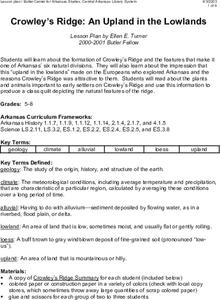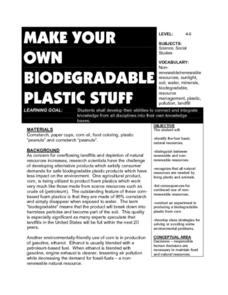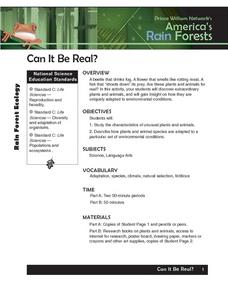ARKive
Sizing Up Species: Measurement Activities
Measurement devices can be used to determine the height, length, or weight of all kinds of things, even plants and animals. This presentation acts as the basis for two estimation activities. Each activity requires the children to...
Georgian Court University
Introduction to Marsh Ecology
Compare and contrast the characteristics of fresh and salt water marshes. After exploring the typical plants and animals found in each marsh type, participants use a set of flash cards to sort into fresh and salt water marsh life. Their...
Chicago Botanic Garden
Migration, Adaptation, and Changing Climates
It is easy for humans to adapt to changing environments, but how do animals and plants do it? Classes discuss how plants and animals deal with environmental changes in the second of seven lessons. Through questions and discussions,...
PreKinders
Colors of Nature
The colors of nature are the most beautiful and vivid colors in the world. Show kids the ways that colors are striking and changing throughout different habitats with a set of images that feature two animals or plants for each color.
University of Maryland
Pollination
Sixteen ounces of honey requires more than 1,000 bees traveling over 100,000 miles and visiting 4.5 million flowers. The presentation includes sexual reproduction in plants, the parts and functions of a flower, pollination,...
Curated OER
Exploring Regions of Our World
Examine how climate and landforms affect plants and animals that live in particular areas. Discover that these same factors affect peoples' homes, jobs, and recreational activities. Pupils research ecosystems and biomes, and then write...
K12 Reader
Fungi Are Alive
They are alive even though they are neither plants or animals! Yes, fungi are the subject of this two-part comprehension worksheet. Kids read the article and then use information found there to respond to comprehension questions.
Montana Natural History Center
Studying Grassland Ecosystems
At first glance, grassland ecosystems might seem dull and uninteresting, but once you start to explore it's amazing the things you'll find! Through this series of engaging lessons, activities, and experiments, elementary students examine...
It's About Time
Adaptations
Congratulations! You exist, thanks to the wonders of biology and adaptations. The focus of the lesson explains many adaptations of plants and animals and how the environment has influenced the process. A hands-on activity demonstrates...
Curated OER
You Can Depend On me
Discover the natural beauty of California. With a conservation bent, this activity delves into some of the attributes that make this state unique. Learners discuss Yosemite and the forest habitat. They focus on the things plants and...
PreKinders
Rainforest Word Cards
Great for a science lesson or language arts activity, these picture word cards feature animals and plants that live in rainforest habitats. It includes pictures and names of rainforest residents like lemurs, monkeys, and parrots.
American Museum of Natural History
What's This? Feeding
Some species have pretty creative methods for catching food. Young scientists learn about some interesting ways organisms get the nutrients they need by navigating an online interactive lesson that would be suitable for a remote learning...
American Museum of Natural History
What's This? Reproduction
Attracting the right mate is as important for humans as any other species. An interesting lesson teaches individuals about several strategies that animals and plants have adapted to attract their mates. From colorful nests to powerful...
Curated OER
Crowley's Ridge: An Upland in the Lowlands
This clever lesson combines elements of geography, art, literature, and storytelling. Pupils take a close look at the six geographical regions of Arkansas, and pay close attention to Crowley's Ridge - which is one of the six. In groups,...
Curated OER
Make Your Own Biodegradable Plastic Stuff
Students identify the four basic natural resources. They distinguish bettween renewable and non-renewable resources. Pupils recognize that all natural resources are needed by living plants and animals. Students list consequences for...
PreKinders
Forest Word Cards
Explore the animals of the forest with a set of vocabulary cards. Each half-page card features the name of an animal with a corresponding photograph, as well as a few plants.
Curated OER
Keys and Classifying
Students classify plants and animals. In this organisms instructional activity, students define classification and sort various objects according to its attributes. Students then research wildlife of Utah and group the organisms into...
Curated OER
Name Match: Plants
In this name match worksheet, students match up fourteen different types of plants to their formal names by drawing a line from one to the other.
Curated OER
America's Rain Forests Can It Be Real?
Students examine the attributes of unusual plants and animals before determining how they are adapted to specific habitat. They complete an associated worksheet. They make posters with information that they find during research sessions.
Curated OER
Variation
Students recognize similarities and differences in plants. In this plants and animals lesson, students begin to classify living things by observable characteristics. Students watch clips from the Internet and play online games. Students...
Curated OER
Living Sources of Weathering
In this sources of weathering worksheet, learners read about the various things that cause weathering including plants and animals. They answer four critical thinking questions about weathering.
University of New Mexico
New Mexico Land of Enchantment
Third graders research Native American Cultures surrounding New Mexico. They analyze the history and geography of the state. They play a guessing game that incorporates the indigenous plants and animals of New Mexico. In groups, learners...
Curated OER
Native Plant Research Project
Students study indigenous plants. They examine why they are special, why some might be threatened, by what forces (pollution, habitat destruction), and what else relies on the continued existence of these plants (insects, animals). They...
Curated OER
Extra! Extra!
Students describe how plants and animals depend on each other. They see how living and nonliving environments change over time. They identify ways in which humans have changed their environment and the effects of those changes.
Other popular searches
- Arctic Plants and Animals
- Aquatic Plants and Animals
- Coastal Plants and Animals
- Artic Plants and Animals
- Plants and Animals Needs
- Animals and Plants
- Plants and Animals Interact
- Desert Plants and Animals
- Plants and Animals Die
- Attic Plants and Animals
- Comparing Plants and Animals
- Animals Plants and Water

























